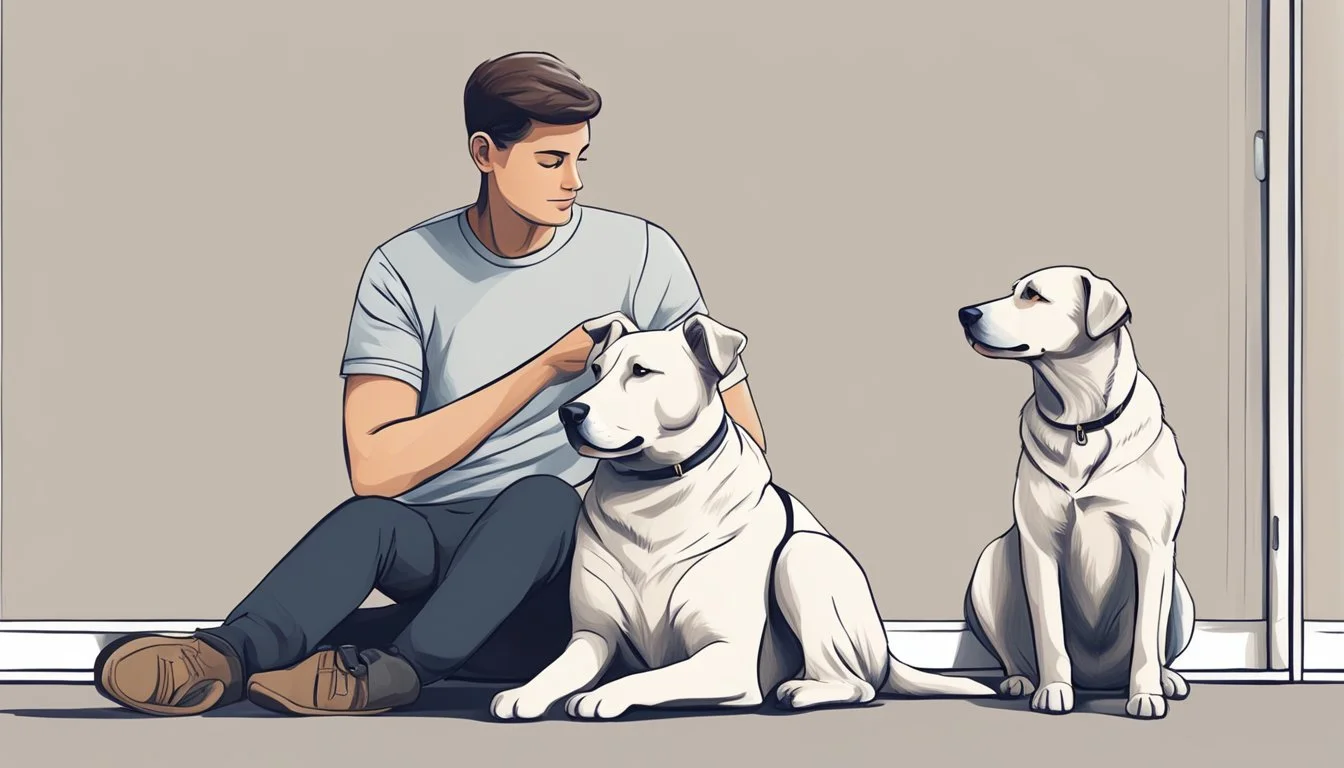Recognizing How Your Pet Supports Your Mental Wellbeing
Pets can have a profound impact on their owners' mental health and well-being. Many people find comfort and solace in the presence of their animal companions, especially during times of stress or anxiety. The bond between humans and their pets often goes beyond simple companionship, extending into the realm of emotional support and therapeutic benefits.
Research has shown that interacting with pets can help reduce stress hormones, lower blood pressure, and improve overall mood. While dogs are commonly recognized for their ability to provide emotional support, other pets like cats, birds, and even small animals can also play a significant role in alleviating anxiety symptoms. Recognizing the signs that a pet is helping with anxiety can lead to a greater appreciation of the animal-human bond and its positive effects on mental health.
1) Constant Companionship
Dogs provide unwavering companionship to their owners. They stay by their human's side throughout the day, offering a comforting presence during anxious moments.
This constant companionship can help alleviate feelings of loneliness and isolation often associated with anxiety. The mere presence of a pet can provide a sense of security and emotional support.
Dogs are particularly attuned to their owners' emotions. They may sense when their human is feeling anxious and respond by staying close, offering physical contact, or providing gentle distractions.
The regular routine of caring for a pet can also help structure the day, giving people with anxiety a sense of purpose and responsibility. This can be especially beneficial during periods of high stress or uncertainty.
The unconditional love and acceptance that dogs offer can boost self-esteem and reduce feelings of worthlessness that often accompany anxiety. Their non-judgmental nature provides a safe space for individuals to express themselves freely.
2) Reduced Stress Levels
Pets can have a significant impact on reducing their owners' stress levels. The presence of a furry companion often leads to decreased cortisol, the stress hormone, in humans.
Interacting with pets, such as petting a dog or cat, can trigger the release of oxytocin, known as the "love hormone." This chemical promotes feelings of relaxation and well-being.
Many pet owners report feeling calmer and more at ease when their animals are nearby. The rhythmic sound of a cat purring or the gentle breathing of a sleeping dog can have a soothing effect.
Pets also provide a welcome distraction from daily worries and stressors. Focusing on caring for an animal can shift attention away from anxiety-inducing thoughts and situations.
Regular physical activity with pets, like walking a dog, can further reduce stress levels. Exercise releases endorphins, which are natural mood boosters and stress relievers.
The unconditional love and companionship offered by pets create a sense of security and comfort. This emotional support can help buffer against the negative effects of stress in daily life.
3) Lower Blood Pressure
Pets, especially dogs, can have a positive impact on blood pressure levels. Studies have shown that pet ownership is associated with lower blood pressure readings in some individuals.
The act of petting or stroking an animal can induce a state of relaxation, which may lead to a decrease in blood pressure. This calming effect can be particularly beneficial for those who experience anxiety or stress-related hypertension.
Regular dog walking provides cardiovascular exercise, which is known to help maintain healthy blood pressure levels. Even the simple act of playing with a pet can increase physical activity and contribute to better heart health.
Research suggests that the presence of a pet can help reduce the body's stress response during challenging situations. This reduction in stress hormones may contribute to more stable blood pressure readings over time.
Pet owners often experience increased social interactions, which can have positive effects on mental health and, by extension, blood pressure. Social support is an important factor in managing stress and maintaining overall cardiovascular health.
4) Increased Social Interaction
Pets can act as social catalysts, encouraging their owners to engage more with others. Dogs, in particular, often prompt their owners to venture outside for walks or visits to dog parks.
These outings create opportunities for casual interactions with other pet owners or passersby. Such encounters can help individuals with social anxiety gradually become more comfortable in social situations.
Pets also serve as conversation starters. People often find it easier to approach someone with a pet, asking questions about the animal's breed or behavior. This can lead to more natural and relaxed social exchanges.
For those who struggle with initiating conversations, having a pet provides a ready-made topic to discuss. Sharing stories about their furry companions can help break the ice in social settings.
Pet ownership can also lead to participation in pet-related events or groups. These gatherings offer a chance to connect with like-minded individuals who share similar interests, potentially fostering new friendships.
5) Distraction from Negative Thoughts
Pets can be powerful distractions from anxious thoughts and worries. Their presence often redirects attention away from stressful ruminations, providing a welcome mental break.
When feeling overwhelmed, playing with a pet or simply observing their antics can shift focus to the present moment. This natural redirection helps interrupt cycles of negative thinking.
Caring for a pet's needs also creates positive distractions. Feeding, grooming, or exercising an animal requires concentration on immediate tasks rather than future concerns.
Many pet owners find that watching their animals' carefree behavior helps put worries into perspective. A dog's excitement over a simple walk or a cat's contentment while napping can remind people to appreciate life's small joys.
Petting or cuddling with an animal stimulates the release of oxytocin, a hormone associated with bonding and stress relief. This physical connection can help calm an overactive mind.
For some, talking to pets about their concerns provides a safe outlet for expressing feelings without judgment. This verbal processing can help alleviate mental tension.
6) Physical Contact and Comfort
Pets often provide physical comfort to their owners, which can help alleviate anxiety symptoms. Many animals, especially dogs and cats, enjoy cuddling and physical contact with their human companions.
This close physical proximity can trigger the release of oxytocin, often referred to as the "love hormone," in both the pet and the owner. Oxytocin is known to reduce stress and promote feelings of calm and well-being.
Petting an animal has been shown to lower blood pressure and heart rate, physiological markers often associated with anxiety. The rhythmic motion of stroking a pet's fur can be soothing and meditative, helping to redirect focus away from anxious thoughts.
Some pets may instinctively sense when their owner is feeling anxious and seek to provide comfort. They might lean against their owner, place a paw on them, or simply sit nearby, offering a reassuring presence.
For individuals with anxiety, the warmth and tactile sensation of a pet's body can serve as a grounding technique, helping to bring attention back to the present moment and away from worrying thoughts.
7) A Sense of Purpose
Pets can provide their owners with a profound sense of purpose. Caring for an animal requires daily attention and commitment, which can be especially beneficial for those struggling with anxiety.
Having a pet to feed, walk, and care for creates a routine and structure in one's life. This responsibility can help shift focus away from anxious thoughts and onto the immediate needs of the animal.
For many, the act of nurturing a living being brings a sense of fulfillment and importance. Knowing that a pet relies on them can boost self-esteem and reduce feelings of worthlessness often associated with anxiety.
Pets also offer opportunities for social interaction. Dog owners, for example, may meet other pet owners during walks or at the park, potentially expanding their social circle and reducing isolation.
The bond between a person and their pet can be a powerful motivator. It encourages individuals to maintain a healthy lifestyle, as they need to be present and capable of caring for their animal companion.
8) Unconditional Love
Pets offer a unique form of unconditional love that can be incredibly beneficial for individuals struggling with anxiety. Dogs, in particular, are known for their unwavering affection and loyalty towards their owners.
This pure, judgment-free love creates a safe emotional space for people to express themselves without fear of rejection. Pets accept their humans exactly as they are, providing constant support and companionship.
The consistent presence of a pet's love can help reduce feelings of loneliness and isolation often associated with anxiety. Their affectionate behaviors, such as nuzzling or cuddling, offer physical comfort and emotional reassurance.
For many, the bond with a pet becomes a source of stability and comfort during times of stress or uncertainty. This reliable emotional support can help alleviate anxiety symptoms and promote a sense of calm and security.
The unconditional love of a pet serves as a reminder of the positive aspects of life, potentially shifting focus away from anxious thoughts. This loving connection can foster improved self-esteem and emotional well-being in pet owners.
9) Routine and Structure
Pets often thrive on routine, which can have a positive impact on their owners' anxiety levels. A consistent schedule for feeding, walks, and playtime creates a sense of predictability and stability in daily life.
This structured routine can help individuals with anxiety feel more grounded and in control. The responsibility of caring for a pet at set times throughout the day provides a sense of purpose and can serve as a distraction from anxious thoughts.
For many people, the simple act of following a routine with their pet can be calming and reassuring. It offers a sense of normalcy and can help break the cycle of worry that often accompanies anxiety.
Pets can also encourage their owners to maintain a more regular sleep schedule. The need to wake up at a consistent time to feed or walk a pet can help establish healthier sleep patterns, which are often disrupted by anxiety.
Additionally, the structure provided by pet care responsibilities can help individuals stay organized and focused. This increased sense of order in daily life may contribute to reduced anxiety levels over time.
10) Exercise Motivation
Pets can be excellent motivators for increasing physical activity, which is beneficial for managing anxiety. Dogs, in particular, often require regular walks and outdoor playtime, encouraging their owners to engage in daily exercise.
This consistent physical activity can help reduce stress and anxiety levels in both humans and animals. The act of walking or playing with a pet releases endorphins, the body's natural mood boosters.
Many pet owners find that their furry companions provide the necessary push to maintain an exercise routine. The responsibility of caring for a pet's physical needs can transform into a positive habit for the owner's mental health.
Even indoor pets like cats can inspire more movement around the house. Interactive play sessions with feline friends can increase physical activity and provide a welcome distraction from anxious thoughts.
Regular exercise with pets not only improves physical fitness but also strengthens the bond between animal and owner. This emotional connection can be a source of comfort and stability during anxious periods.
11) Mindfulness and Presence
Dogs excel at living in the moment, a skill many humans struggle to master. Their natural ability to be present can help owners practice mindfulness and reduce anxiety.
When walking a dog, owners often find themselves more aware of their surroundings. The dog's enthusiasm for sights, sounds, and smells encourages people to pay attention to the world around them.
This heightened awareness can shift focus away from anxious thoughts. Instead of dwelling on worries, dog owners may find themselves noticing the texture of grass, the warmth of sunlight, or the sound of birds chirping.
Petting a dog can also serve as a grounding exercise. The sensation of fur, the rhythm of the dog's breathing, and the warmth of their body provide tactile experiences that anchor one to the present moment.
Dogs don't worry about the future or regret the past. Their example can remind owners to focus on the here and now, which is a key principle of mindfulness practices.
By encouraging owners to engage fully with the present, dogs can help reduce anxiety and promote a sense of calm. This natural form of mindfulness practice can complement other anxiety management techniques.
12) Improved Mood
Pets can have a significant positive impact on their owners' mood. The presence of a furry companion often leads to increased feelings of happiness and contentment.
Interacting with pets releases oxytocin, a hormone associated with bonding and positive emotions. This natural mood boost can help alleviate symptoms of anxiety and depression.
Caring for a pet provides a sense of purpose and routine, which can be especially beneficial for individuals struggling with mental health challenges. The act of feeding, walking, or playing with a pet can offer a welcome distraction from anxious thoughts.
Pet owners often report feeling less lonely and more socially connected. Even in times of isolation, the companionship of a pet can provide comfort and emotional support.
The unconditional love and acceptance that pets offer can boost self-esteem and reduce feelings of worthlessness often associated with anxiety and depression. This positive reinforcement contributes to an overall improved mood and outlook on life.
13) Companionship in Public Spaces
Pets can provide valuable support in public settings for individuals with anxiety. Many pet owners find comfort in bringing their animals to pet-friendly spaces.
Dogs, in particular, can act as social facilitators. Their presence often encourages interactions with other people, helping to ease social anxiety.
In crowded or unfamiliar environments, pets can serve as a calming presence. Focusing on the animal can help divert attention from anxiety-inducing stimuli.
Pet-friendly public spaces are becoming more common, recognizing the importance of animal companionship. These areas allow individuals to enjoy outings with their pets, potentially reducing stress.
For those with social anxiety, having a pet nearby can provide a sense of security and comfort. The animal's presence may help its owner feel more at ease in social situations.
It's important to note that pets in public spaces should be well-behaved and under control. Proper training and adherence to local regulations ensure a positive experience for everyone.
Understanding the Human-Animal Bond
The connection between humans and animals, particularly pets, is profound and multifaceted. This bond can significantly impact mental health and emotional well-being, providing unique forms of support and companionship.
Benefits of Pet Companionship
Pet ownership offers numerous advantages for mental and physical health. Studies show that interacting with pets can lower blood pressure and reduce stress hormones. Dogs encourage regular exercise through walks and playtime, promoting cardiovascular health.
Cats provide calming companionship and can help reduce anxiety. The act of petting an animal releases oxytocin, a hormone associated with bonding and relaxation. Pet owners often report improved mood and decreased feelings of loneliness.
Pets also provide structure and routine, which can be especially beneficial for individuals struggling with depression or anxiety disorders. The responsibility of caring for an animal can give a sense of purpose and accomplishment.
Emotional Support and Pets
Pets offer unconditional love and non-judgmental support, creating a safe emotional space for their owners. This can be particularly valuable for individuals dealing with anxiety or trauma. Animals often sense their owners' emotional states and respond with comforting behaviors.
Many people find it easier to open up emotionally in the presence of a pet. This can facilitate communication with therapists or loved ones. Service animals and emotional support animals are trained specifically to assist individuals with mental health conditions.
Pets can serve as social catalysts, helping their owners connect with others and reduce social isolation. Dog parks and pet-related events provide opportunities for social interaction and community building.
Pets as Emotional Therapy
Pets provide powerful emotional support and therapeutic benefits for people struggling with anxiety. Their companionship can significantly reduce stress levels and improve mental wellbeing through both psychological and physiological mechanisms.
How Pets Reduce Stress
Interacting with pets releases oxytocin, serotonin, and dopamine in the brain. These "feel-good" chemicals promote relaxation and elevate mood. Petting or cuddling an animal lowers blood pressure and heart rate. The rhythmic motion of stroking fur has a calming effect.
Pets offer unconditional love and non-judgmental companionship. Their presence alleviates loneliness and provides comfort during difficult times. Caring for a pet gives a sense of purpose and routine, which can be grounding for those with anxiety.
Taking a dog for walks encourages exercise and time outdoors. This physical activity and fresh air naturally reduce stress and anxiety symptoms. Pets also facilitate social interactions, helping owners feel more connected to others.
The Science Behind Pet-Assisted Therapy
Studies show measurable physiological changes when people interact with animals. Heart rate, blood pressure, and cortisol levels decrease, while oxytocin increases. Brain scans reveal activation in areas associated with bonding and pleasure.
Research indicates pet owners have lower rates of depression and anxiety compared to non-pet owners. They also report higher self-esteem and life satisfaction. In clinical settings, animal-assisted therapy reduces anxiety in patients before medical procedures.
Pet therapy programs in hospitals, nursing homes, and schools demonstrate positive outcomes. Interaction with therapy animals improves mood, reduces agitation, and increases social behavior in various populations. The benefits extend beyond the immediate interaction, with lasting improvements in mental health.
Recognizing Behavioral Changes
Pets often display subtle changes in behavior that can indicate their sensitivity to their owner's emotional state. These shifts may manifest in various ways, from altered activity levels to changes in social interactions.
Signs Your Pet Responds to Your Mood
Pets frequently exhibit behavioral cues that reflect their awareness of their owner's emotional state. Dogs may become more attentive, staying closer to their anxious owners or offering physical comfort through gentle nudges or leaning against them.
Cats might display increased vocalization or seek more physical contact when sensing their owner's distress. Some pets may mirror their owner's anxiety, showing signs of restlessness or heightened alertness.
Changes in eating habits can also occur, with some pets eating less when their owners are stressed. Conversely, other animals may become more food-motivated during times of household tension.
Behavioral Changes in Pets Due to Owner's Anxiety
When owners experience prolonged anxiety, their pets may develop persistent behavioral changes. Dogs might become more protective or territorial, barking more frequently at perceived threats.
Cats may exhibit increased grooming behaviors or seek out hiding spots more often. Both dogs and cats might display changes in their sleep patterns, either sleeping more or becoming restless at night.
Some pets may develop compulsive behaviors, such as excessive licking or pacing. Changes in social interactions with other household pets or family members can also occur, with some animals becoming more withdrawn or others seeking increased attention.
Pets may also show physical symptoms of stress, including trembling, panting, or changes in body posture. These reactions highlight the deep connection between pet and owner emotions.












